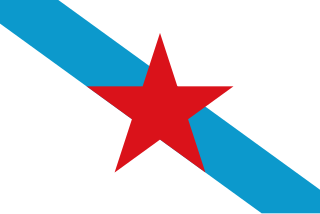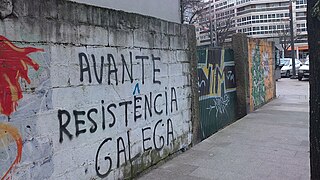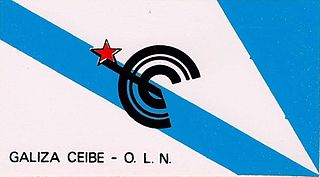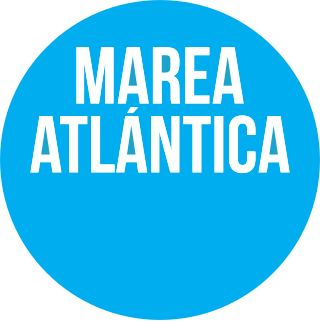
The Galician Nationalist Bloc is a political party from Galicia, formed with the merger of a series of left-wing Galician nationalist parties. It is self-defined as a "patriotic front".

Communist Party of National Liberation was a separatist political party in Galicia, Spain. PCLN was founded on 25 July 1986 by the 22 March Communist Collective. The collective had been launched earlier by 13 Central Committee members of the Galician People's Union (UPG) left UPG in protest of the decision of the Galician Nationalist Bloc to participate in the Galician parliament. Front figures of the collective was Mariano Abalo, general secretary of UPG, and Xan Carballo, general secretary of INTG.

Galician nationalism is a form of nationalism found mostly in Galicia, which asserts that Galicians are a nation and that promotes the cultural unity of Galicians. The political movement referred to as modern Galician nationalism was born at the beginning of the twentieth century from the idea of Galicianism.

Resistência Galega, sometimes referred to as REGA, is the term used by a series of left-wing and Galician separatist organisations and individuals to claim attacks in Galicia. The term was first used in 2005 when a manifesto named Manifesto da Resistência Galega appeared on the Internet. Since then, Resistência Galega has carried out dozens of attacks against political party offices and banks across Galicia.

The 2012 Galician regional election was held on Sunday, 21 October 2012, to elect the 9th Parliament of the autonomous community of Galicia. All 75 seats in the Parliament were up for election. The election was held simultaneously with a regional election in the Basque Country.

The Galician Alternative of the Left was an electoral alliance of left-wing independentist and federalist political parties in Galicia, Spain.

Renewal–Nationalist Brotherhood is a political party in Galicia. Formed in 2012, under the guidance of historical leader Xosé Manuel Beiras, Anova was formed by Encontro Irmandiño, the FPG, Movemento pola Base, the Galician Workers Front, and independents. Anova defines itself as a Galician nationalist, socialist, feminist, ecologist, internationalist organization and advocates for Galician independence. Its internal organization is run by assemblies.

Galiza Ceibe-OLN was an independentist and socialist political party in Galicia, Spain. Galiza Ceibe was founded on 1980 by the Galician Party of the Proletariat as a political and electoral front, originally to present a list in Vigo and in other galician municipalities under the name Agrupación Electoral Galicia Ceibe in the 1979 local elections.
The Assembly of the United People (APU) was a Galician political organization, with an independentist, socialist and feminist ideology. It was formed in 1989 from a split of the first Galician People's Front, and disappeared with its self-dissolution in 1995.

The Galician National-Popular Bloc was a Galician electoral candidacy. It had as the national sovereignty for Galiza as its main objective and as an alternative to autonomism. It was formed by the Galician People's Union (UPG) and Galician National-Popular Assembly (ANPG).

Commitment to Galicia is a Galician political party with a Galician nationalist, progressive ideology.
Galician Workers' Front is a Galician political organization. It was formed in 2010 by militants of the trade union world, mainly of the Confederación Intersindical Galega (CIG). The organization was integrated in the Galician Nationalist Bloc (BNG) until 2012, when the FOGA abandoned the BNG and was one of the three parties that formed Renewal–Nationalist Brotherhood.
The Central Unitaria de Traballadores is a Galician union created in the December 1998 after a split with the Confederación Intersindical Galega. The CUT has very close ties with the Galician People's Front.

Marea Atlántica is a grassroots movement and political coalition in the city of A Coruña, Spain.

Ferrol en Común is a grassroots movement and political coalition in the city of Ferrol, Galicia whose goal is to build a left-wing and participative political electoral alliance. FeC is supported by political parties like Anova-Nationalist Brotherhood (Anova-IN), United Left (EU) and the local circle of Podemos in the city of Ferrol.

The Communist Party of the Galician People is a Galician political organization with a communist and independentist ideology founded in 1984.

En Marea was a political party and former political alliance integrated by Podemos, Anova, United Left of Galicia, and some municipal alliances that participated in the 2015 Spanish local elections. It was formed in November 2015 as an electoral coalition to contest the 2015 Spanish general election in Galicia. As part of the coalition agreement with Podemos, the name on the ballot paper for both the 2015 and 2016 general elections was Podemos–En Marea–Anova–EU.

The 2020 Galician regional election was held on Sunday, 12 July 2020, to elect the 11th Parliament of the autonomous community of Galicia. All 75 seats in the Parliament were up for election. The election was initially scheduled for 5 April 2020 but was postponed as a result of the COVID-19 pandemic. It was held simultaneously with a regional election in the Basque Country.
We–Galician Candidacy was an electoral alliance of Galician nationalist parties formed ahead of the 2015 Spanish general election by the Galician Nationalist Bloc (BNG), Galician Coalition (CG), Galicianist Party (PG), Communist Party of the Galician People (PCPG) and Galician Workers' Front (FOGA). The alliance failed in securing parliamentary representation in the general election, leaving the BNG out of the Congress of Deputies for the first time in 20 years.

Galicia en Común was a left-wing alliance in Galicia formed by Podemos and United Left (EU) as a successor to the En Marea alliance, which after turning into a party broke up from their three constituent parties in early 2019 as a result of political and leadership differences. The alliance has contested the April 2019 and November 2019 Spanish general elections under the En Común–Unidas Podemos label, and it also exists as a sub-group within the Unidas Podemos confederal parliamentary group in the Congress of Deputies. In September 2019, Podemos and EU, together with Renewal–Nationalist Brotherhood, comprised the Grupo Común da Esquerda parliamentary group, and the alliance is scheduled to be renewed ahead of the 2020 Galician regional election.

















